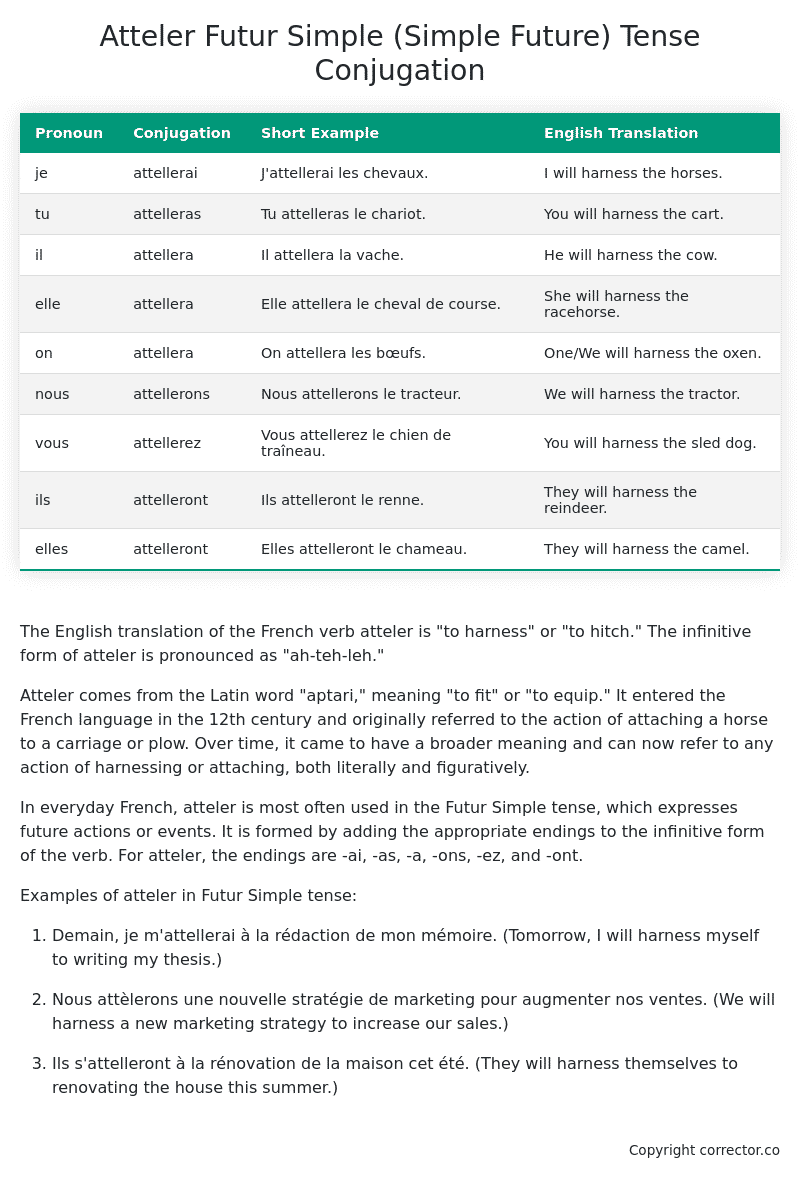Futur Simple (Simple Future) Tense Conjugation of the French Verb atteler
Introduction to the verb atteler
The English translation of the French verb atteler is “to harness” or “to hitch.” The infinitive form of atteler is pronounced as “ah-teh-leh.”
Atteler comes from the Latin word “aptari,” meaning “to fit” or “to equip.” It entered the French language in the 12th century and originally referred to the action of attaching a horse to a carriage or plow. Over time, it came to have a broader meaning and can now refer to any action of harnessing or attaching, both literally and figuratively.
In everyday French, atteler is most often used in the Futur Simple tense, which expresses future actions or events. It is formed by adding the appropriate endings to the infinitive form of the verb. For atteler, the endings are -ai, -as, -a, -ons, -ez, and -ont.
Examples of atteler in Futur Simple tense:
-
Demain, je m’attellerai à la rédaction de mon mémoire. (Tomorrow, I will harness myself to writing my thesis.)
-
Nous attèlerons une nouvelle stratégie de marketing pour augmenter nos ventes. (We will harness a new marketing strategy to increase our sales.)
-
Ils s’attelleront à la rénovation de la maison cet été. (They will harness themselves to renovating the house this summer.)
Table of the Futur Simple (Simple Future) Tense Conjugation of atteler
| Pronoun | Conjugation | Short Example | English Translation |
|---|---|---|---|
| je | attellerai | J’attellerai les chevaux. | I will harness the horses. |
| tu | attelleras | Tu attelleras le chariot. | You will harness the cart. |
| il | attellera | Il attellera la vache. | He will harness the cow. |
| elle | attellera | Elle attellera le cheval de course. | She will harness the racehorse. |
| on | attellera | On attellera les bœufs. | One/We will harness the oxen. |
| nous | attellerons | Nous attellerons le tracteur. | We will harness the tractor. |
| vous | attellerez | Vous attellerez le chien de traîneau. | You will harness the sled dog. |
| ils | attelleront | Ils attelleront le renne. | They will harness the reindeer. |
| elles | attelleront | Elles attelleront le chameau. | They will harness the camel. |
Other Conjugations for Atteler.
Le Present (Present Tense) Conjugation of the French Verb atteler
Imparfait (Imperfect) Tense Conjugation of the French Verb atteler
Passé Simple (Simple Past) Tense Conjugation of the French Verb atteler
Passé Composé (Present Perfect) Tense Conjugation of the French Verb atteler
Futur Simple (Simple Future) Tense Conjugation of the French Verb atteler (this article)
Futur Proche (Near Future) Tense Conjugation of the French Verb atteler
Plus-que-parfait (Pluperfect) Tense Conjugation of the French Verb atteler
Passé Antérieur (Past Anterior) Tense Conjugation of the French Verb atteler
Futur Antérieur (Future Anterior) Tense Conjugation of the French Verb atteler
Subjonctif Présent (Subjunctive Present) Tense Conjugation of the French Verb atteler
Subjonctif Passé (Subjunctive Past) Tense Conjugation of the French Verb atteler
Subjonctif Imparfait (Subjunctive Imperfect) Tense Conjugation of the French Verb atteler
Subjonctif Plus-que-parfait (Subjunctive Pluperfect) Tense Conjugation of the French Verb atteler
Conditionnel Présent (Conditional Present) Tense Conjugation of the French Verb atteler
Conditionnel Passé (Conditional Past) Tense Conjugation of the French Verb atteler
L’impératif Présent (Imperative Present) Tense Conjugation of the French Verb atteler
L’infinitif Présent (Infinitive Present) Tense Conjugation of the French Verb atteler
Struggling with French verbs or the language in general? Why not use our free French Grammar Checker – no registration required!
Get a FREE Download Study Sheet of this Conjugation 🔥
Simply right click the image below, click “save image” and get your free reference for the atteler Futur Simple tense conjugation!

Atteler – About the French Futur Simple (Simple Future) Tense
Formation of Futur Simple
For regular -er verbs (e.g., parler – to speak)
For regular -ir verbs (e.g., finir – to finish)
For regular -re verbs (e.g., vendre – to sell)
Common Everyday Usage Patterns
Conditional Statements
Interactions with Other Tenses
Futur Antérieur
Conditional
Present
Summary
I hope you enjoyed this article on the verb atteler. Still in a learning mood? Check out another TOTALLY random French verb conjugation!


